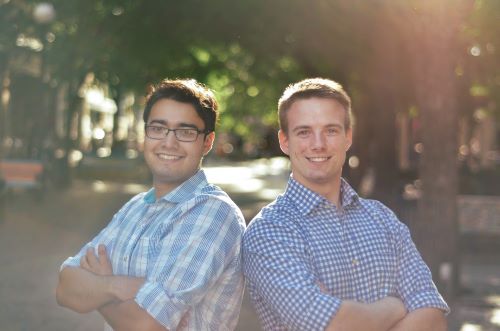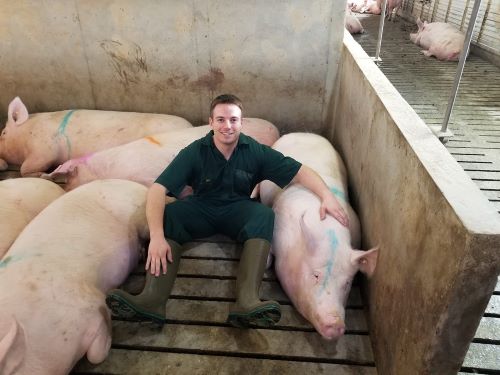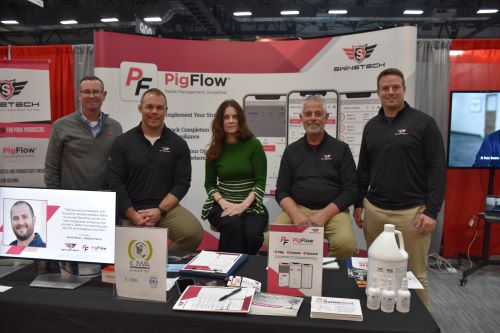PORK Perspectives: A Minute with Matthew Rooda
PORK Perspectives with Matthew Rooda of SwineTech
Matthew Rooda, co-founder and CEO of SwineTech, was born to think outside of the box. As a kid, he drove his four-wheeler to pig farms to do vaccinations. As time passed, he grew stronger and faster, but he still got paid the same. After a conversation with his father, a pork producer, Rooda decided to ask his employers if they would pay him per pig instead of by the hour. The answer? Yes.
This was a pivotal moment for Rooda. He began understanding the value of efficiency.
He started his career in the swine industry working in nurseries and finishers. When the manager of a sow barn took maternity leave, he stepped in to help. His education was also an asset to his experience. While attending Hawkeye Community College and later the University of Iowa for a genetics and biotechnology and business management degree, he worked for Schneider & Schneider Pork Farms as an assistant farm manager. In preparation for medical school, he eventually became a nurse’s aide and then a medication aide at a nursing home called Oaknoll. And that’s where things really got interesting.
“The University of Iowa had an opportunity for students to present business ideas for cash. I’ve worked a power washer a lot, so I've had plenty of time to come up with the world's “greatest” ideas...and most of them were pretty terrible,” Rooda laughs. “But I had this one idea where we could use voice recognition to save piglets from getting laid on.”
Long story short, the idea won and he and his business partner were invited to be a part of a student accelerator program where they were later identified by the Iowa Startup Accelerator.
“They offered us $25,000 to participate in their program, but we had to drop out of school and we only had 24 hours to decide,” Rooda says. “We were going into our senior year. I was pre-med hoping to be an obstetrician and had the MCATs coming up. But my buddy and I decided we were going to do it. We hated it when athletes tried to stay in school when they had these amazing opportunities. We were like, ‘This is our once in a lifetime opportunity, we're going to take it.’”

Matthew Rooda (right) with co-founder and SwineTech chief operating officer Abraham Espinoza.
They dropped out of school and spent 90 days working 16 hours a day in the program. They had the opportunity to pitch their plan in over 25 business plan competitions during that time, racking up prizes worth over $350,000 at places like MIT, Microsoft, Princeton, Under Armor, Harvard and more. The prize money funded research to work on the piglet crushing prevention idea and validated the idea of using a chiropractic TENS impulse to alert a sow to roll over so her piglet won’t be crushed. This spurred the development of SmartGuard, a solution to help stop this problem. And then, the pandemic hit.
“Nobody was going to be investing in new technology during the pandemic,” Rooda says. “It just wasn't going to happen. We had to pivot.”
Read on to learn more about Rooda’s business pivot, his leadership philosophy and his outlook on the pork industry.
Q. Why did you decide to pivot your business idea?
A. The COVID-19 pandemic gave us time to think more deeply about the problems we were seeing on sow farms. We had to sit back and think about what we could do to help mitigate the challenges we were facing with SmartGuard, but also help the industry in a bigger way. We scheduled interviews with over 200 employees representing 30 systems. We were able to validate this point: Unless we go in the farm physically, we really don't know what's happening, who's doing it and if it's compliant. When we talked to employees, they said, “We want to know what we need to do, when we need to do it and if we're doing a good job.” The two really lined up incredibly well. That’s when we decided we were going to put SmartGuard on the backburner and build a new solution for farms around workforce management.
Q. Tell me about your business. What is your why?
A. When we look at how far our business has come over the past seven years, the initial goal was to prevent piglets and sows from dying. That started out by creating a voice recognition technology that could identify a piglet in distress, alert the mom to stand up and save that piglet’s life. But we quickly realized that in order to have sustained impact, all of the processes that followed saving that little pig needed to be well understood, managed and executed on. And we couldn't control that. We wanted to step back and figure out how we could do that. That’s when we created PigFlow, a point-of-care platform for pigs, designed to help understand when and where people need to be and whether or not they did a good job. Our mission is to help producers streamline and monitor routine and emergency care, communication, daily workflows, administrative tasks, herd diagnostics, as well as record storage and transmission. We've put the pig at the core of what we're focused on – the health of that pig and the care for that pig – modeling our approach from human health. The results from heightened accountability and ownership have been exciting with substantial improvements in employee efficiencies, engagement, and pig care.
Q. Describe a typical day on the job for you.
A. It starts with a morning standup where everyone on our team gets together to talk about what happened yesterday and what's going on today. After that, it's an open game. For me, it might be working on the business as a CEO, as a marketer, as a salesperson...a little of everything. Then you sprinkle in meetings and solving problems and it becomes a very dynamic day for me. I enjoy the opportunity to be a part of so many different things and have the confidence to offer value in all of those areas, despite not being able to spend a whole lot of time on them. I enjoy being able to provide input, guidance and hopefully empowerment to the team members who are actually working on those things.
The SwineTech team at the Iowa Pork Congress.
Q. How does your company help and work with its customers?
A. We believe in a partnership approach – the consult-join-counselor approach. We want to understand: What are the challenges being faced? How do we collectively create a strategy to start solving those problems? With SwineTech pivoting to a more holistic approach to pig care and workforce management, it has allowed us to step in and be helpful in many areas. That’s probably one of the most rewarding parts of what we do – being able to connect with people who are taking care of pigs and trying to grow their business, and strategically walking through solutions and strategies that can help make that better.
Q. What concerns do you have about the swine industry?
A. I believe labor, herd health, public perception and viability of our producers are the greatest concerns moving forward. I think another big challenge is that we are at a tipping point of whether or not the individuals who helped build the industry to what it is today want to stay in it. It will have a profound impact on what our industry looks like in five to 10 years. They all have the purview to make that decision for themselves and we’ll have to figure out how to move forward.
Q. What are the greatest opportunities in the swine industry today?
A. Production potential is a big opportunity because we do not maximize our current genetic potential today. We are, in most systems, hundreds of dollars per sow away from the biological limits or genetic potential of that animal. How do we help elevate our industry to that of the 90th percentile? We have so many resources with labor, genetics and so on, that we are just not maximizing. There will be people who figure out how we stay viable as an industry. There will be people who will figure out how we keep raising the bar of our potential. At SwineTech, our core focus is pig care, so how do we make the most of the resources we're already paying for today? There's so much opportunity that just lives within that bucket.
Q. How will the growing threat of foreign animal disease impact the U.S. pork industry’s future?
A. It’s going to push us to be better. Yes, Doomsday might happen. But until then, we're continually refining our biosecurity approaches to be better. Whether we get ASF or not, I think we're better for the threat existing. It’s in the back of our minds, right outside of our borders, pushing us to be better than what we would have been otherwise.
Q. What is your business philosophy?
A. Authenticity, ownership and innovation are our three core values. Authenticity is being who you are. Your unique self brings a perspective, a diversity in itself, that is special. As a society we always talk about diversity around race and gender. But we don't necessarily talk about diversity when it comes to backgrounds and ideas. Even if you're not in the swine industry, if you can come in open-minded and be who you are, you're going to bring a new puzzle piece that we’ve never had before. We're not going to succeed as an industry if we do the same thing we've always been doing. As a business, we need to be who we say we're going to be, not just do what we say we're going to do. If I say, I'm going to be the point-of-care platform for pigs, I need to go out there and invest in that. I need to be 100% committed to being that for our industry. Regarding innovation, we always say “Find the better way.” Don’t let perfect become the enemy of good enough. With those three values, we hope to be an authentic brand and a servant to the industry.

Matthew Rooda loves being a part of an industry that is constantly growing and evolving.
Q. What do you enjoy most about your job?
A. I love being able to work with our customers, our partners, our team, to build relationships, which are often lifelong. My wife works in mental health, and I've got other friends in other industries. I’ve learned from them that people job hop between industries quite often. I think that a really cool thing about our industry is that usually when people are in it, they stay in it. That means every time we go to an event, I'm seeing customers that have been doing this forever. That knowledge and relationship is awesome. I also enjoy building a team. We're in the trenches. Life is changing every day. We're growing by leaps year over year. Challenges come our way, but we're in it together and it's just so much fun.
Q. Who inspires you?
A. My parents and my grandparents were my biggest inspiration growing up and in everything I do today. My dad has accomplished a lot within the swine industry and my mom was always supportive and a very strong person. My grandparents were entrepreneurs. My grandfather was a producer who didn't pivot in a timely manner with the rest of the industry. But admirably, and in such a good work ethic kind of way, he persevered. My other grandfather was a schoolteacher who started a real estate management company while he was just having his first kids. He’s grown that into a very successful business that has been passed on within the family. It was really inspiring to be able to go work for both of my grandparents, whether that was on the farm or painting, scraping and evicting homes as a kid. They are two very different things, but they taught me a good work ethic.
Q. What will the business look like 20 years from now?
A. When I worked as a nursing aide and medication aide, in the most respectful way, I saw an opportunity for pig production to emulate that when it comes to providing high-quality individualized care. I think 20 years from now, our business will look like an imitation of workforce management in healthcare. I think we can use that system to provide transparent, high-quality care at an individual basis to pigs. We've got computer vision, sensors and technology that is becoming less expensive. I think we will be emulating healthcare on a day-to-day basis.
Q. If you could go back and do something differently in your career, what would it be and why?
A. I am happy where I am today. If I change something, that entire story is gone or could be changed. However, I do wish when I started working, someone had told me how crazy one year of eating out all the time will totally make a difference. I would have drank far less of those Starbucks double shots, and ate far less Casey's breakfast pizza and fast food.
Q. What advice do you have for someone who might like to do what you do someday?
A. I always tell individuals thinking about an idea to go get involved in an industry that you're passionate about and work your ass off to figure out what holds you back. Because whatever is holding you back from accomplishing your goals is likely holding the rest of the industry back as well. There's your problem. Go passionately pursue the problem before you passionately pursue the idea.
More from Farm Journal's PORK:
Mental Toughness: Make the Most of What Life Throws at You
PIC Invests in SwineTech








